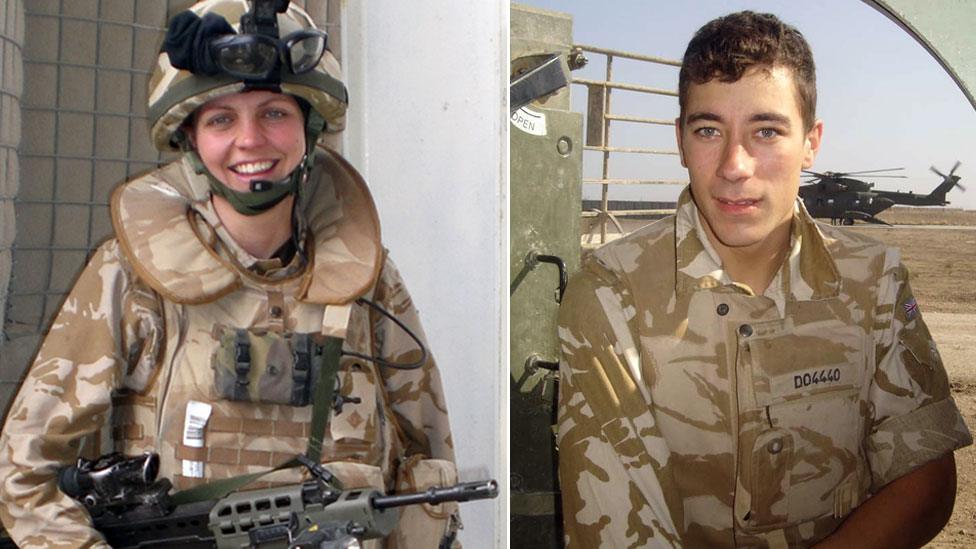Chilcot report: Tony Blair's Iraq War case not justified
- Published
Sir John Chilcot: "The UK chose to join the invasion of Iraq before peaceful options for disarmament had been exhausted"
Tony Blair overstated the threat posed by Saddam Hussein, sent ill-prepared troops into battle and had "wholly inadequate" plans for the aftermath, the UK's Iraq War inquiry has said.
Chairman Sir John Chilcot said the 2003 invasion was not the "last resort" action presented to MPs and the public.
There was no "imminent threat" from Saddam - and the intelligence case was "not justified", he said.
Mr Blair apologised for any mistakes made but not the decision to go to war.
The report, which has taken seven years, is on the Iraq Inquiry website, external.
Prime Minister David Cameron, who voted for war in 2003, told MPs it was important to "really learn the lessons for the future" and to improve the workings of government and how it treats legal advice.
And he added: "Sending our brave troops on to the battlefield without the right equipment was unacceptable and, whatever else we learn from this conflict, we must all pledge this will never happen again."
Labour leader Jeremy Corbyn - who voted against military action - said the report proved the Iraq War had been an "act of military aggression launched on a false pretext", something he said which has "long been regarded as illegal by the overwhelming weight of international opinion".
After meeting relatives of British service people killed in Iraq, Mr Corbyn said: "I now apologise sincerely on behalf of my party for the disastrous decision to go to war."
He urged the UK to back moves to give the International Criminal Court "the power to prosecute those responsible for the crime of military aggression".
A spokesman for some of the families of the 179 British service personnel and civilians killed in Iraq between 2003 and 2009 said their loved ones had died "unnecessarily and without just cause and purpose".
He said all options were being considered, including asking those responsible for the failures identified in the report to "answer for their actions in the courts if such process is found to be viable".
Tony Blair responds to report
Tony Blair expressed sorrow, regret and apology
In a statement to the media, his voice at times cracking with emotion, the former Labour prime minister said the decision to commit troops was the "most agonising and momentous" decision in his decade as prime minister, adding that he would "carry it with me for the rest of my days".
"I feel deeply and sincerely in a way that no words can properly convey the grief and sorrow of those who lost ones they loved in Iraq - whether our armed forces, the armed forces of other nations or Iraqis.
"The intelligence assessments made at the time of going to war turned out to be wrong, the aftermath turned out to be more hostile, protracted and bloody than ever we imagined.... and a nation whose people we wanted to set free from the evil of Saddam became instead victims of sectarian terrorism.
"For all of this, I express more sorrow, regret and apology than you may ever know or can believe."
But he was defiant on the central decision to go to war, saying "there were no lies, Parliament and Cabinet were not misled, there was no secret commitment to war, intelligence was not falsified and the decision was made in good faith".

Analysis
By Peter Hunt, BBC correspondent
It's been a long wait.
It may prove to have been a worthwhile wait for the people who have always opposed the Iraq War.
Remember, one million individuals took to the streets in 2003 in opposition to the march to war.
They will seize on this Inquiry's judgement that Saddam Hussein didn't pose an immediate threat and military action at that time was not a last resort.
Those seeking action against Tony Blair are likely to be disappointed - but probably not that surprised - that a panel which didn't include any lawyers, hasn't expressed a view on whether military action was legal.
Sir John Chilcot's public remarks were peppered with the word "failure".
But he was careful not to apportion blame.
Others will now do that on the evidence his report has placed in the public domain.
The political space will be filled with claims and counter claims about a war in Iraq where - as Sir John Chilcot put it - its people have suffered greatly.

In a nearly two hour news conference he said he would never agree that those who died or were injured in Iraq "made their sacrifice in vain" as they had played their part in "the defining global security struggle of the 21st century against the terrorism and violence which the world over destroys lives, divides communities".
Quizzed about what he was apologising for, he said: "There is no inconsistency in expressing my sorrow for those that have lost their lives - my regret and my apology for the mistakes - but still saying I believe the decision was right. There is no inconsistency in that."
He said the US would have launched an invasion "either with or us or without us", adding: "I had to decide. I thought of Saddam and his record, the character of his regime. I thought of our alliance with America and its importance to us in the post 9/11 world and I weighed it carefully with the heaviest of hearts."
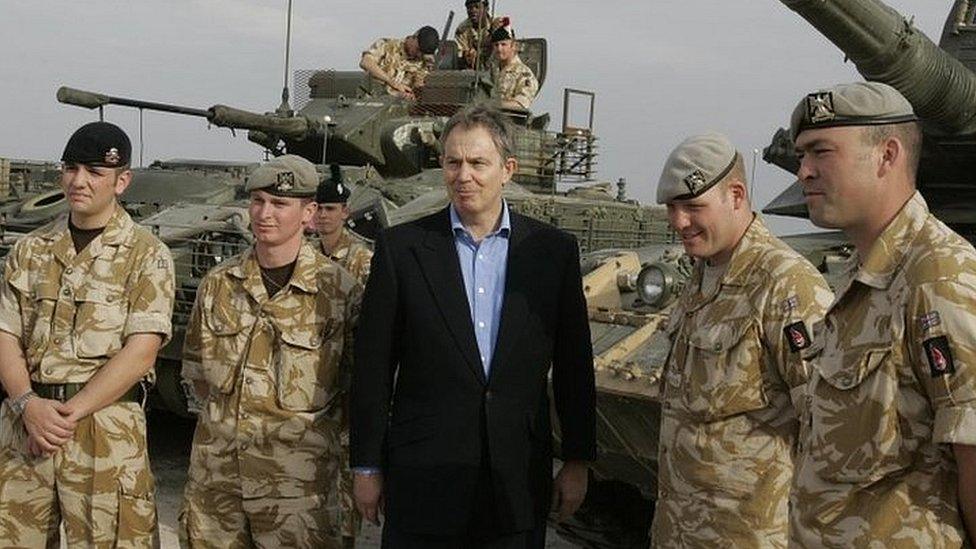
Mr Blair, who was PM from 1997 to 2007, conceded that intelligence on Iraq's weapons had "turned out to be wrong" and the invasion had destabilised Iraq but said he still believed the country was "better off" without Saddam, comparing it with the situation in Syria where the decision had been taken not to intervene.
He also said he should have "disclosed" the attorney general's legal advice to the Cabinet on the eve of war - but he defended his close relationship with President Bush, saying: "we are better to be strongly onside with the US", arguing that it was "better for our own security".
George Bush comments
George W Bush's communications director, Freddy Ford, told BBC News: "President Bush is hosting wounded warriors at his ranch today and has not had the chance to read the Chilcot report.
"Despite the intelligence failures and other mistakes he has acknowledged previously, President Bush continues to believe the whole world is better off without Saddam Hussein in power.
"He is deeply grateful for the service and sacrifice of American and coalition forces in the war on terror. And there was no stronger ally than the United Kingdom under the leadership of Prime Minister Tony Blair.
"President Bush believes we must now find the unity and resolve to stay on the offensive and defeat radical extremism wherever it exists."
The key points of the report
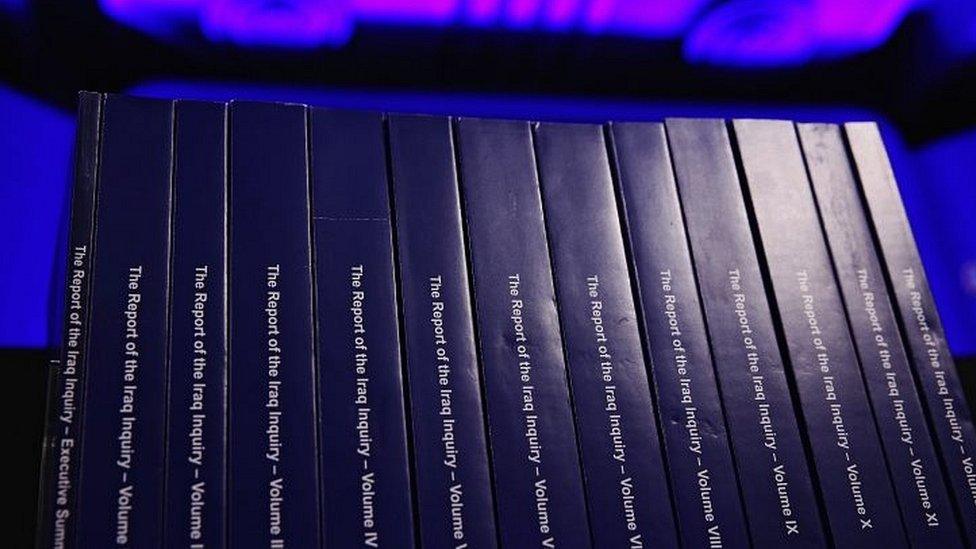
The report is 12 volumes long
Sir John, the ex-civil servant who chaired the inquiry, describes the Iraq War as an intervention that went "badly wrong" with consequences still being felt to this day - and he set out lessons to be learned for future conflicts.
His report, which is 2.6 million words, does not make a judgement on whether Mr Blair or his ministers were in breach of international law.
But it does highlight a catalogue of errors in political and military decision-making, including:
UK military commanders made "over-optimistic assessments" of their capabilities which had led to "bad decisions"
There was "little time" to properly prepare three military brigades for deployment in Iraq. The risks were neither "properly identified nor fully exposed" to ministers, resulting in "equipment shortfalls"
Policy on the Iraq invasion was made on the basis of flawed intelligence assessments. It was not challenged, and should have been
Mr Blair overestimated his ability to influence US decisions on Iraq; and the UK's relationship with the US does not require unconditional support
In his statement, Sir John said military action against Saddam Hussein might have been necessary "at some point" but that when Britain joined the US-led invasion in March 2003, the Iraqi dictator posed "no imminent threat", the existing strategy of containment could be continued and the majority of UN Security Council members supported continuing UN inspections and monitoring".
He added: "The judgements about the severity of the threat posed by Iraq's weapons of a mass destruction - WMD - were presented with a certainty that was not justified. Despite explicit warnings, the consequences of the invasion were underestimated."
UK military fatalities
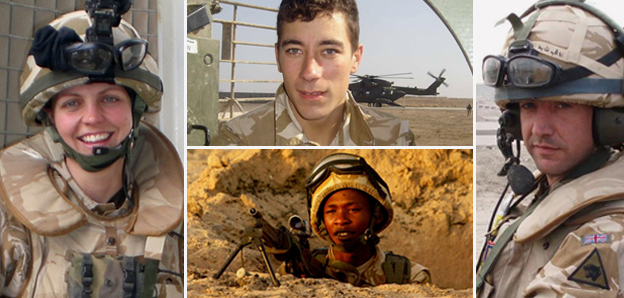
Blair/Bush memos
Previously classified documents, including 31 personal memos from Tony Blair to then US president George W Bush, have been published alongside the Chilcot Report.
They show that momentum in Washington and London towards taking action against Saddam Hussein quickly began to build in the wake of the 9/11 attacks in 2001 in the US, which killed nearly 3,000 people.
On the day after the attack on New York's Twin Towers, Mr Blair sent a note to President Bush offering his support to bring to justice the hijackers and looked ahead to the "next stage after this evil".
Mr Blair said some would "baulk" at the measures necessary to control "biological, chemical and other weapons of mass destruction", but added: "We are better to act now and explain and justify our actions than let the day be put off until some further, perhaps even worse, catastrophe occurs."
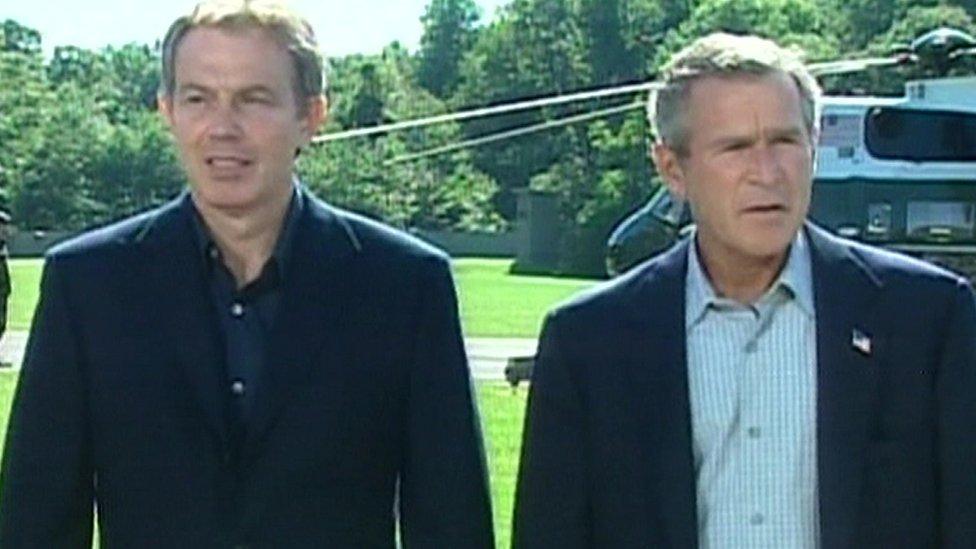
In a 2002 memo, Mr Blair suggested he would be with the US president "whatever"
The memos reveal that Mr Blair and Mr Bush were openly discussing toppling Saddam Hussein as early as December 2001, when the UK and US had just launched military action in Afghanistan.
"How we finish in Afghanistan is important to phase 2. If we leave it a better country, having supplied humanitarian aid and having given new hope to the people, we will not just have won militarily but morally; and the coalition will back us to do more elsewhere," says Mr Blair in the memo.
"We shall give regime change a good name which will help in our arguments over Iraq."
In another memo, from July 2002 - nearly a year before the invasion of Iraq - Mr Blair assured President Bush that the UK would be with him "whatever," but adds that if Mr Bush wanted a wider military coalition he would have to get UN backing, make progress on Middle East peace and engineer a "shift" in public opinion in the US, UK and the Arab World.
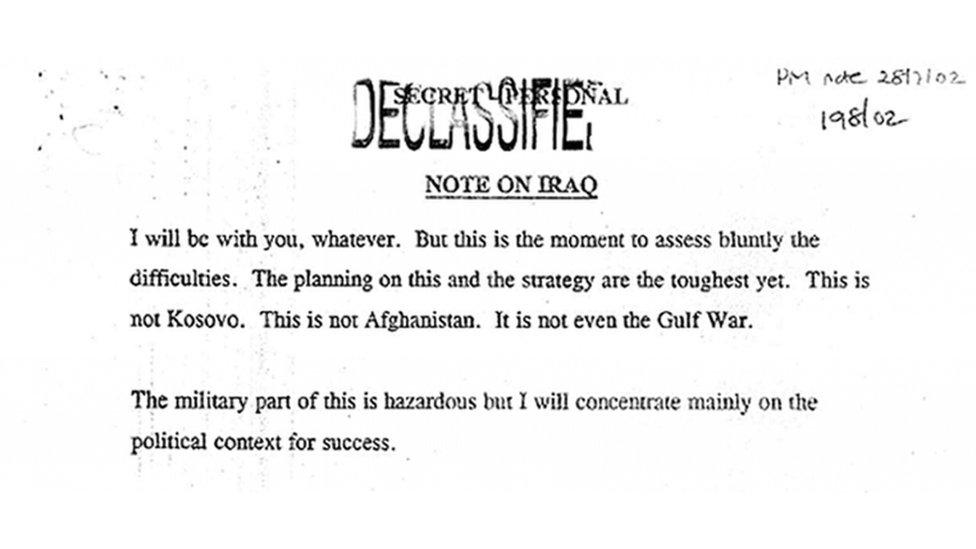
The note, marked "personal," was shared with then Foreign Secretary Jack Straw, but not then defence Secretary Geoff Hoon - a decision criticised by Sir John, who is scathing about the way the collective Cabinet discussion was bypassed by the Blair government.
Intelligence failures
Sir John echoes the criticisms made in earlier reports into the Iraq War of the use of intelligence about Saddam's alleged weapons of mass destruction to justify war.
It says the assessed intelligence had not established "beyond doubt" that Saddam Hussein had continued to produce chemical and biological weapons.
Of Mr Blair's September 2002 statement warning that Saddam Hussein had an arsenal of biological and chemical weapons that could be launched within 45 minutes of the command to use them, Sir John says: "The judgements about Iraq's capabilities in that statement, and in the dossier published on the same day, were presented with a certainty that was not justified."
On the eve of war Mr Blair told MPs that he judged that the possibility of terror groups in possession of weapons of mass destruction was a "real and present danger to Britain and its national security".
"Mr Blair had been warned, however, that military action would increase the threat from al-Qaeda to the UK and UK interests. He had also been warned that an invasion might lead to Iraq's weapons and capabilities being transferred into the hands of terrorists," said Sir John.
The legality of the war
The then attorney general Lord Goldsmith advised Mr Blair to seek explicit UN authorisation for military action but when diplomatic efforts failed, informed him that intervention was lawful on the basis of previous UN resolutions on Iraq relating back to the 1991 Gulf War.
Jeremy Corbyn: "Invasion of Iraq has been a catastrophe"
Iraq inquiry: 'Lessons must be learnt'- David Cameron
Sir John said the report did not make a judgement on the legality or otherwise of the war - pointing out that participants did not give evidence under oath and his findings had no legal force.
But he added: "The circumstances in which it was decided that there was a legal basis for UK military action were far from satisfactory."
In the report he says Lord Goldsmith should have been asked to set out in writing how he arrived at his change of view.
When the UK failed to get a UN resolution specifically authorising military action in March 2003, Mr Blair and then foreign secretary Jack Straw blamed France for an "impasse" in the UN and said the UK government was "acting of behalf of the international community to "uphold the authority of the Security Council".
But Sir John concludes that the opposite was true. "In the absence of a majority in support of military action, we consider that the UK was, in fact, undermining the Security Council's authority," he said in his statement.
Post-war planning and aftermath
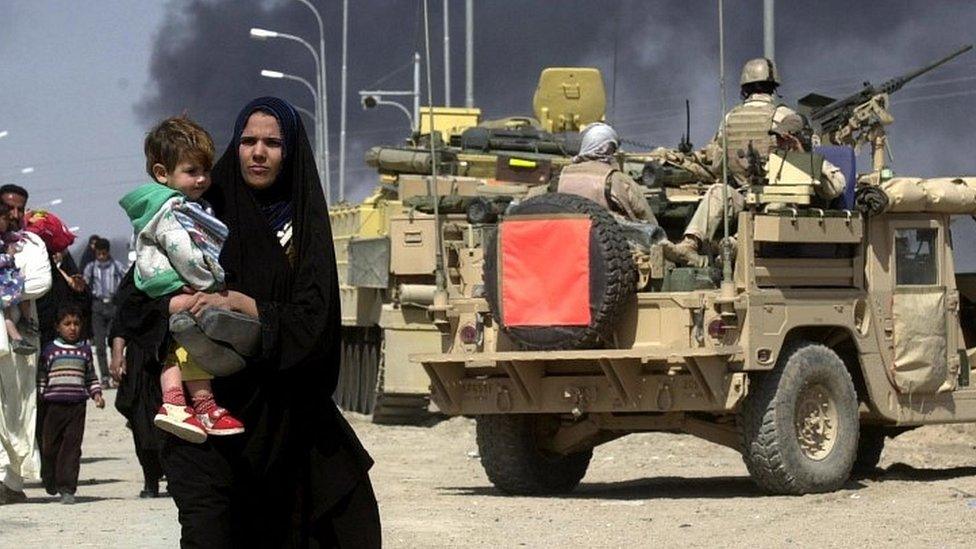
Much of the report focuses on the post-war planning for the governance of Iraq, originally undertaken by the US-led Coalition Provisional Authority in Baghdad, and how well equipped British troops were to oversee the large area of southern Iraq around Basra.
Many of the witnesses to the inquiry, including former ministers and military commanders, were highly critical of what they said were failures in the Ministry of Defence to provide the necessary resources and equipment and the UK's general deferral to the US in key areas.
In his statement, Sir John said: "We have found that the Ministry of Defence was slow in responding to the threat of improvised explosive devices and that delays in providing adequate medium weight protected patrol vehicles should not have been tolerated.
"It was not clear which person or department or department within the Ministry of Defence was responsible for identifying and articulating such capability gaps. But it should have been."
Mr Blair told the inquiry the difficulties encountered in Iraq after the invasion could not have been known in advance but the inquiry says, the risks of "internal strife", regional instability and al-Qaeda activity in Iraq were each "explicitly identified before the invasion".
"The planning and preparations for Iraq after Saddam Hussein were wholly inadequate. The government failed to achieve its stated objectives."
The report acknowledged that the initial campaign to overthrow Saddam was successful and praised the "great courage" of service personnel and civilians involved during and after the invasion, which led to the deaths of more than 200 UK nationals and at least 150,000 Iraqis.
But the report adds that Britain's military role "ended a very long way from success" and it was "humiliating" that British troops was reduced to doing deals with a local militia group in Basra, releasing captured militants in return for an end to attacks on British forces.
Wider reaction
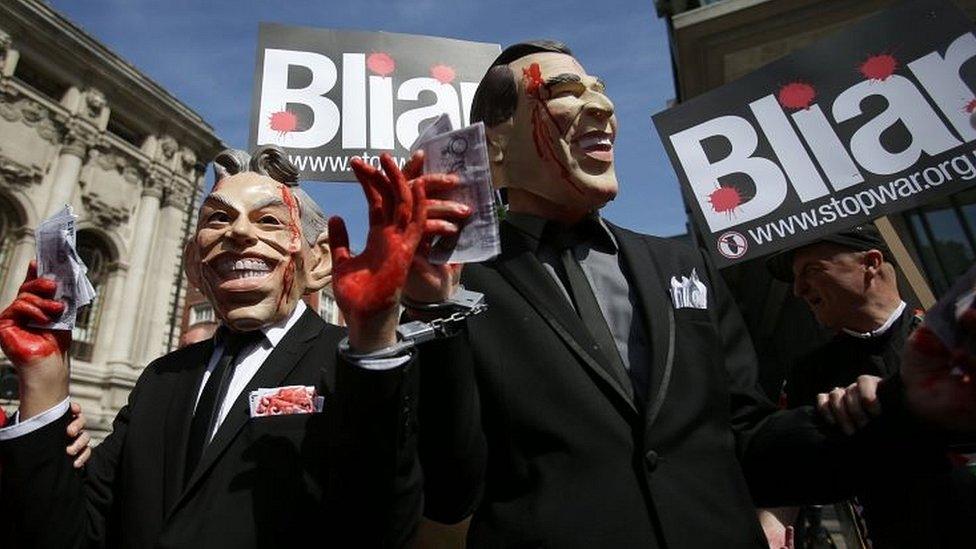
There was an anti-war protest outside as Sir John Chilcot spoke
Sir John said he hoped the report would answer some of the questions the relatives of those who died and enabled them to make their own mind up on the basis of the evidence.
Sarah O'Connor says her 'family died' when her brother Bob died in the Iraq war
Iraq Inquiry: Alex Salmond says action must follow
Alastair Campbell says the Chilcot report shows people were not misled
Reg Keys, whose son Tom was killed in Iraq four days before his 21st birthday, told a news conference that his son had "died in vain".
And Karen Thornton, whose son Gunner Lee Thornton died in 2006 after being shot while on patrol in Iraq, told BBC Radio 4's Today that she wanted Mr Blair to face war crimes charges if it was proved he had lied. "I think the people who lied should be held to account for what they have done," she said. "They are responsible for the deaths of so many people."
Lib Dem leader Tim Farron, whose party opposed the war, said Mr Blair owed the British people an apology.
"It's a stark contrast between Mr Blair's absolute, ruthless determination to go to war almost no matter the evidence on the one hand and on the other hand his complete failure and the government's failure to plan at all over what happened next," he said.
The SNP, which also opposed the war, said it wanted to know why Tony Blair had supported the invasion "come what may", adding that those who failed in their duties must be held accountable for their actions.
And leading lawyer Philippe Sands, who gave evidence to the inquiry, said the cabinet had been "misled about the legal advice".
But Mr Blair's former director of communications Alastair Campbell said he did not believe people were "misled" and the report now lays to rest "the allegations of lying and deceit".
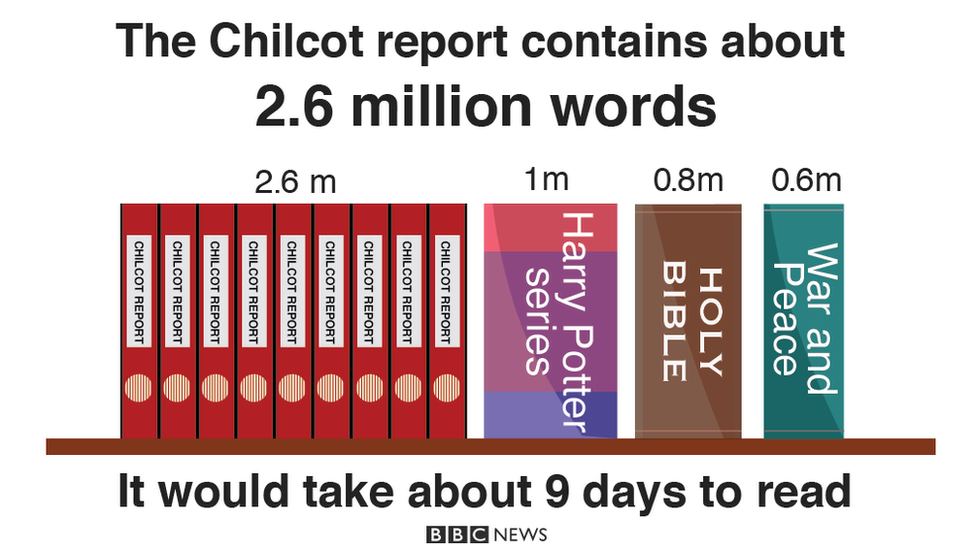
What was the Iraq War?
The war, which lasted about six weeks, ended Saddam Hussein's 25-year regime in Iraq, but the aftermath unleashed years of sectarian violence that has killed thousands since then.
The US, which led the intervention in March 2003, lost 4,487 service personnel in the war. Figures about Iraqi deaths vary from 90,000 to more than 600,000.
The worst attack happened last weekend when so-called Islamic State militants - who control swathes of Iraq and Syria - launched a suicide bombing in the Iraqi capital, Baghdad, killing more than 250 people.
- Published6 July 2016
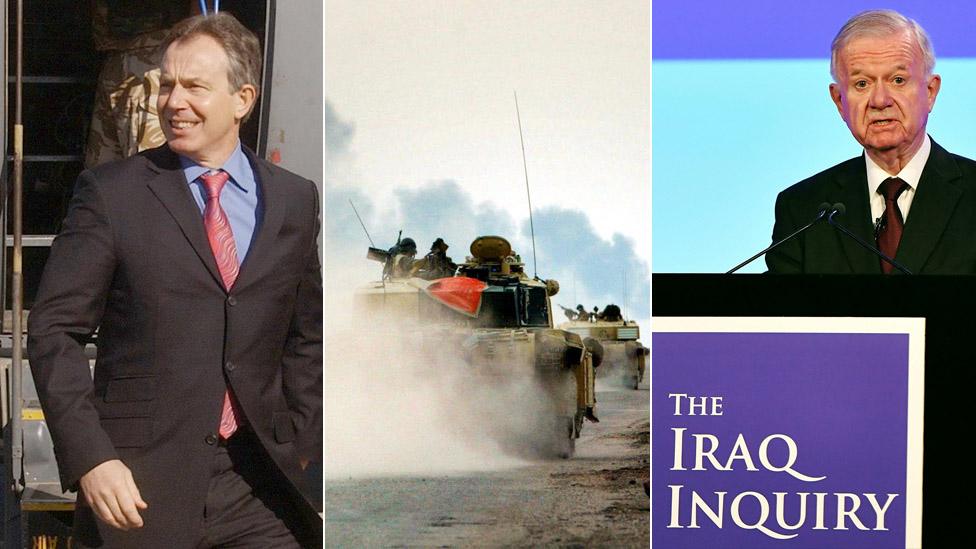
- Published4 July 2016
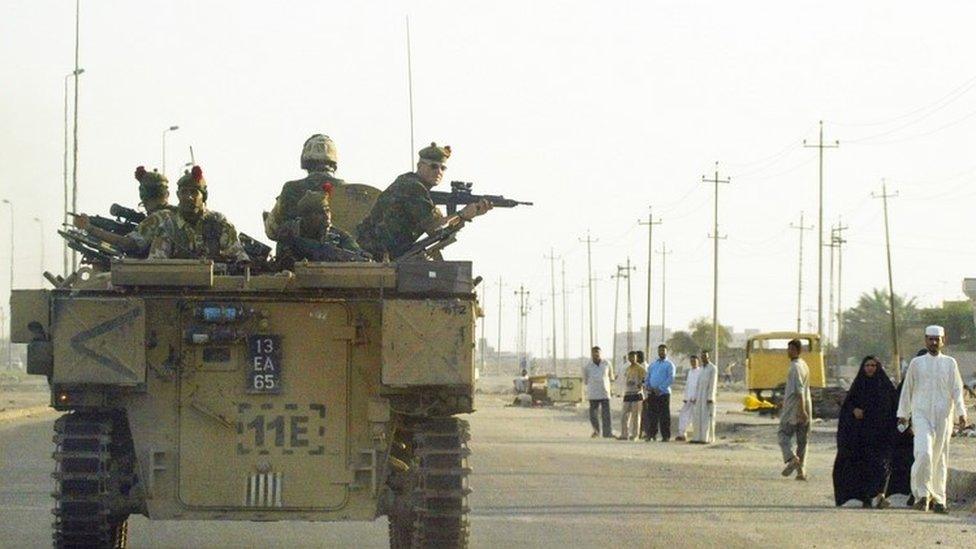
- Published6 July 2016
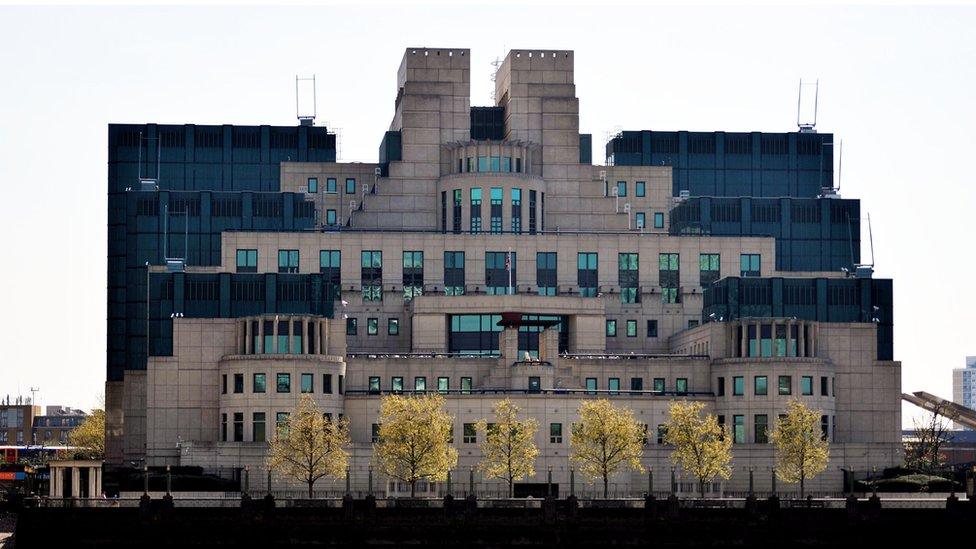
- Published4 July 2016
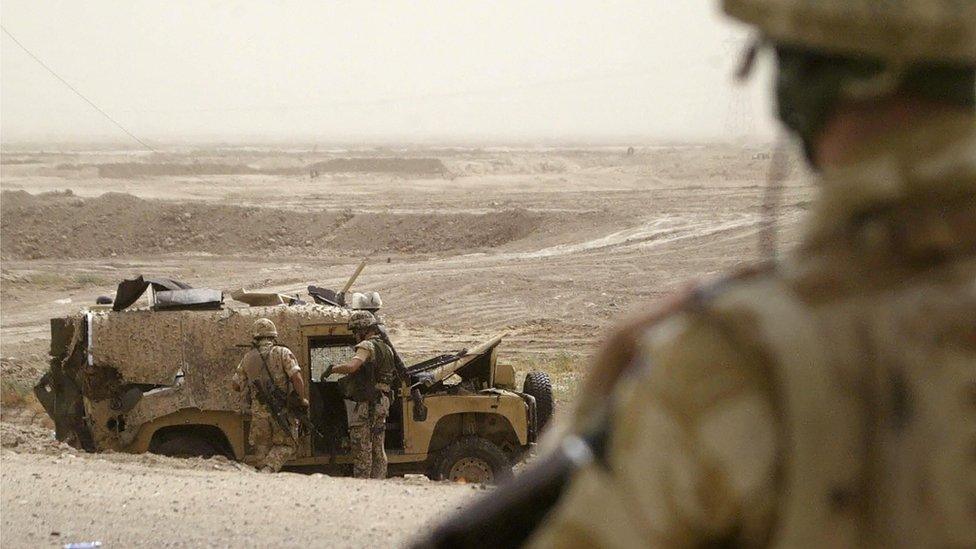
- Published5 July 2016
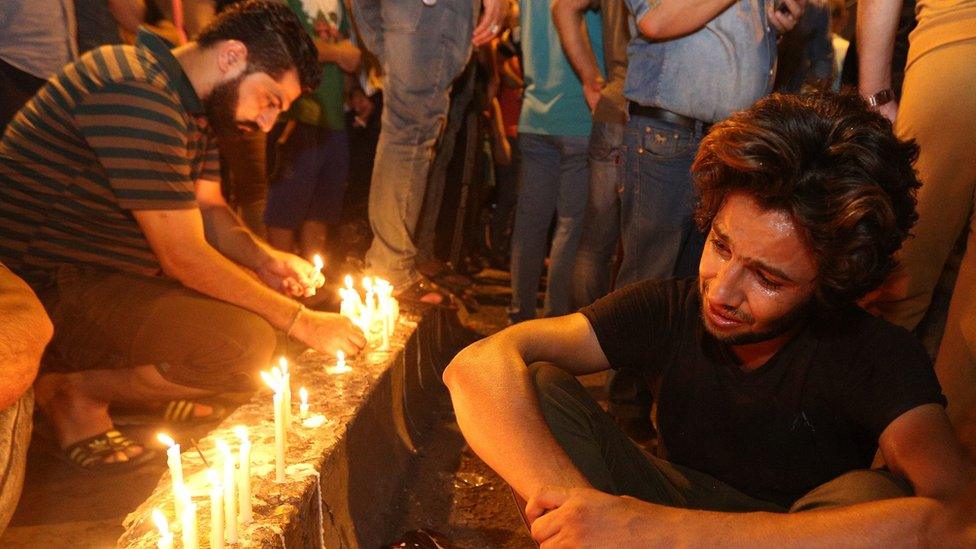
- Published7 July 2016
